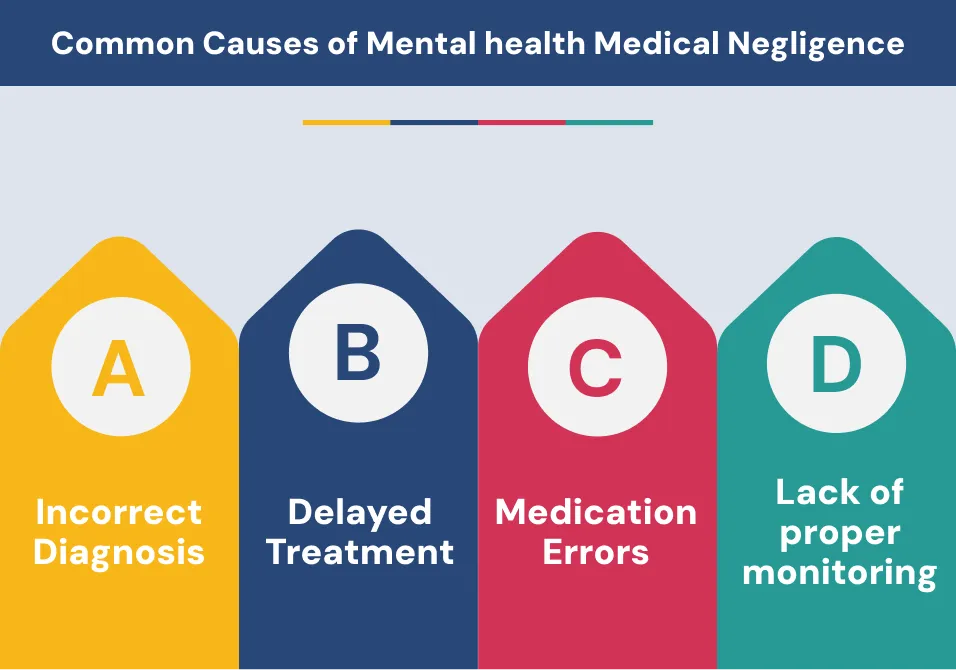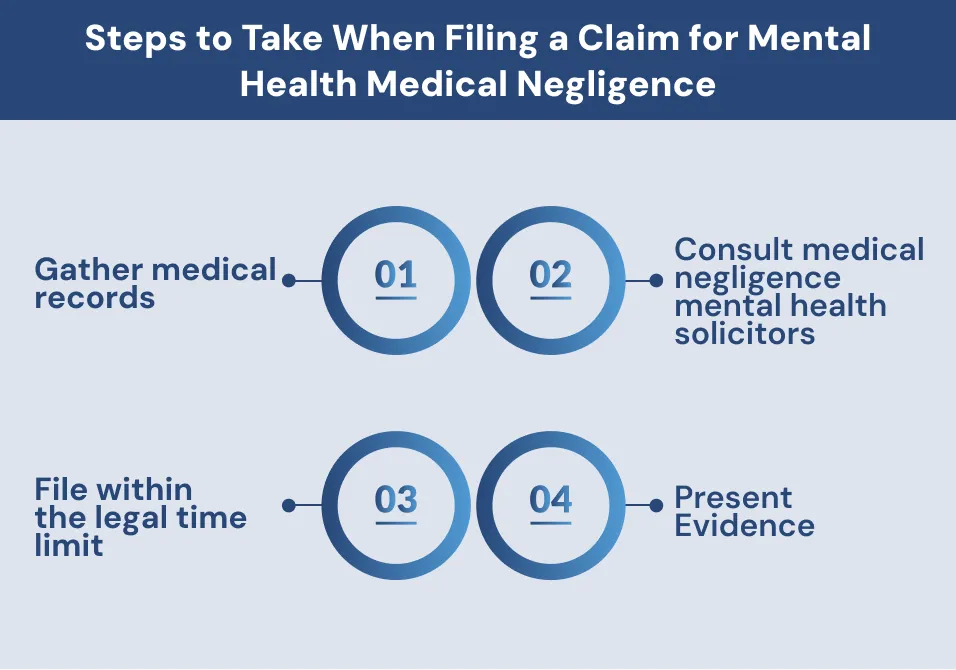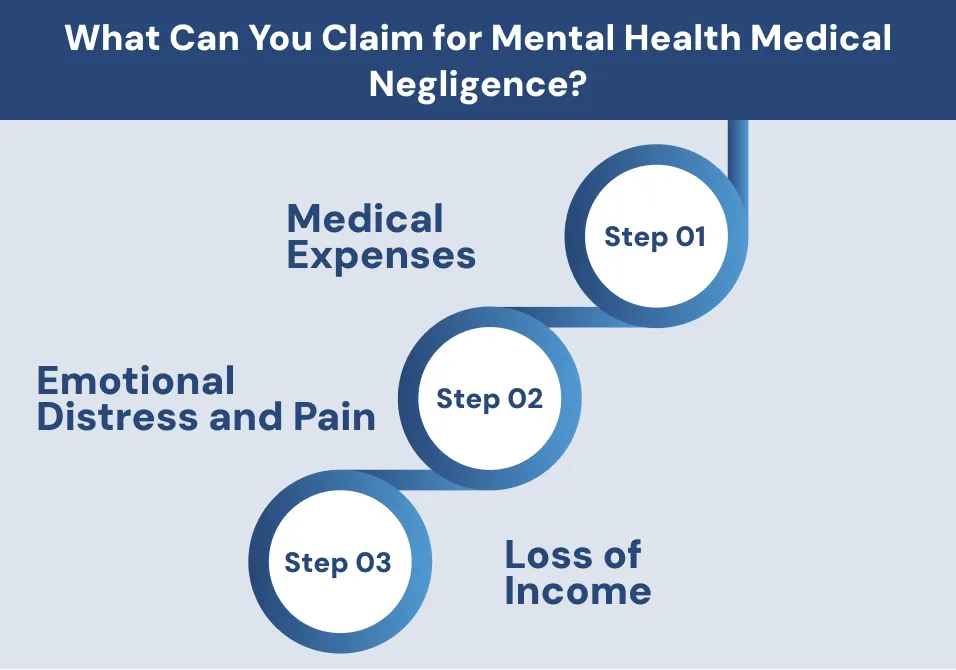TABLE OF CONTENT
- Common Causes of Mental health Medical Negligence
- Duty of Care in Mental Health UK Cases
- Mental Health Negligence Cases in the UK
- Impact of Medical Negligence on Mental Health Patients
- Legal Claims for Mental Health Medical Negligence
- Preventing Mental Health Medical Negligence
- Ensuring Accountability in Mental Health Care
- How Concise Medico Helps You?
- FAQs
When healthcare professionals fail to provide proper treatment, mental health medical negligence occurs. Mental health negligence cases are not the same as physical ones. Common examples include misdiagnosis, delayed treatment, or failing to monitor patients. In the UK, doctors, psychiatrists, and hospitals must provide prompt and correct care under the duty of care. If that duty is not met or trust is broken, the consequences can be severe. Mental health medical negligence cases affect more than just the individual. Families and caregivers get affected when care isn’t provided.
Common Causes of Mental health Medical Negligence
The examples often of mental health medical negligence form the basis claims. Common causes of medical negligence in mental health cases are:
-
Incorrect diagnosis
Labeling a patient with the wrong disorder leads to bad treatment. This can mean a person does not get the help they truly need. Mislabeling also creates confusion and delays in proper care.
-
Delayed treatment
Ignoring or postponing necessary care worsens conditions. When help comes too late, symptoms may become more severe. Early support is key to preventing a crisis.
-
Medication errors
Prescribing the wrong drugs or incorrect dosages can harm a patient. A wrong dose may cause side effects or leave the condition untreated. Clear checks are needed to stop these mistakes.

-
Lack of proper monitoring
Not keeping an eye on high-risk patients, like those who might self-harm, puts them in danger. Regular check-ins help spot warning signs before they turn into emergencies. Close watch prevents small issues from growing.
Duty of Care in Mental Health UK Cases
Every medical professional in the UK has to undertake and obey a duty of care for mental health in the UK. This is an essential requirement as per the law. They need to deliver treatment that meets a fair and expected standard. If they fail, it may result in a breach of duty, allowing patients to file a claim.
1. Legal Obligation of Healthcare Providers
The law says doctors, nurses, and mental health professionals must be skilled and competent. The provider may be liable if a patient gets affected from bad judgment, negligence, or delayed action. One important rule used in these cases is called the Bolam Test. The Bolam Test, from the case Bolam v Friern Hospital Management Committee (1957), sets the legal standard. This test helps the court decide if the care given was acceptable. Courts see if a group of qualified medical experts would choose the same way in similar cases of mental health treatment.
“If a doctor reaches the standard of a responsible body of medical opinion, he is not negligent”
Bolam v Friern Hospital Management Committee [1957]
2. Key Responsibilities Under Duty of Care for Mental Health UK
The following are core duties healthcare providers must follow in mental health cases. Failing in any of these areas can lead to medical negligence cases for mental health patients.
- Give the right diagnosis and check what the patient needs.
- Offer the best treatment or send the patient to an expert.
- Watch closely patients who might harm themselves.
- Give safe medicine and avoid drugs that could cause harm.
- Keep patient details private unless you must step in to keep them safe.
Mental Health Negligence Cases in the UK
In recent years, medical negligence mental health cases have increased. The NHS data reveals that UK residents made over 13,784 mental health negligence claims last year.
South London and Maudsley NHS Foundation Trust [2001] EWCA Civ 33
A tragic case of mental health negligence occurred when a patient left a crisis centre. The medical staff sent them home but didn’t give the follow-up care they needed. This led to self-harm. The person later died by suicide. The family filed a claim under UK mental health laws. They held the hospital responsible for the duty of care.
Impact of Medical Negligence on Mental Health Patients
1. Emotional and Psychological Harm
Mental health negligence cases can cause severe emotional distress. Patients who believe in the system may feel alone when their health declines due to medical errors. Anxiety, depression, and a loss of confidence in doctors are common results. A study found that mental health patients who faced neglect felt more anxious about future treatment. Many fear seeking medical help again.
2. Worsened Patient Outcomes
Delayed or incorrect treatment can lead to irreversible harm. Patients may experience:
- Long-term mental health declines due to a lack of intervention.
- Increased hospital admissions due to worsening conditions.
- Losing a job or friends can happen if symptoms are not managed well.
Legal Claims for Mental Health Medical Negligence
If you or someone close to you has dealt with mental health medical negligence, you could file a legal claim. The UK legal system requires proof of the following to ensure the claim is genuine:
- A duty of care is owed.
- That duty was breached.
- The breach directly caused harm.
- The patient suffered measurable damage.
Steps to Take When Filing a Claim
-
Gather Medical Records
Initiate by collecting all the records linked to your mental care. These may consist of your healthcare provider’s notes, any drug orders, lab reports, and hospital release forms. Having everything in one place will help support your claim.
-
Consult Medical Negligence Mental Health Solicitors
Talk to a solicitor who focuses on mental health medical negligence. They can explain your rights and assess if your case is strong. These experts know how to deal with complex medical and legal matters.
-
File Within the Legal Time Limit
In the UK, there’s usually a 3-year window from when the issue happened to make a claim. Missing this deadline could cost you your opportunity. That’s why it’s smart to confer with a lawyer right away.

-
Present Evidence
You need to prove that mental health negligence harmed you. This could become a bigger problem. It might cause emotional pain or physical effects from the wrong treatment. You can back up your claim with witness statements, medical reports, and expert opinions.
What Can You Claim For?
If you’ve suffered from mental health medical negligence, you may have the right to pursue damages. This is to assist in mitigating the effect that the error had on your life.
-
Medical Expenses
You may have the chance to recoup the fees for any extra treatment you sought because of deficient care. This might entail therapy, aftercare visits, medications, or support to help you heal.
-
Emotional Distress and Pain
If the error induced emotional hardship like anxiety, low spirits, or a loss of trust in medical assistance you are eligible to seek compensation for medical negligence. Many people find their mental health suffers more after mistakes in their treatment.
-
Loss of Income
If you have to take time off work or lose your job because of the negligence caused, you can claim for lost wages. In some instances, people file claims for future income they can’t make due to a long-term illness.

To learn more about how our medical negligence mental health solicitors can assist you, visit us for expert witness report and legal guidance.
Preventing Mental Health Medical Negligence
Legal claims can help mental health medical negligence victims get justice. However, prevention is the main goal. Healthcare providers need to move fast to cut down on medical negligence in mental health.
1. Improved Training and Assessment
Doctors and nurses must undergo continuous training in mental health care. This covers early diagnosis methods. It also shows how to handle medications safely and check patient risks.
2. Better Communication and Follow-Up
A lot of mental health negligence cases happen because of miscommunication among providers. Hospitals must ensure:
- Clear referral pathways to mental health specialists.
- Frequent follow-ups for high-risk patients.
- Stronger crisis intervention protocols.
3. Strengthening Duty of Care Mental Health UK Laws
Authorities need to apply UK laws more firmly. This will help stop medical negligence in mental health cases. We need to hold doctors responsible for their mistakes. This way, patients can be safe.
Ensuring Accountability in Mental Health Care
Cases of mental health negligence are increasing. This points to serious gaps in patient care. UK mental health laws aim to keep people safe, but many still face misdiagnosis, delayed treatment, and poor care. We must hold healthcare providers accountable. This will help make mental health services better and safer.
How Concise Medico Helps You?
If you or a loved one has faced mental health negligence, Concise Medico is here to help. Our experts have expertise in duty of care in mental health UK and mental health medical negligence cases. We will guide you through the legal process. This will help you get justice and fair compensation.
Contact Concise Medico today. Get a consultation. Take the first step to protect your rights and improve mental health care in the UK.
FAQs
When healthcare professionals fail to provide proper treatment, mental health medical negligence occurs. Mental health negligence cases are not the same as physical ones. Common examples include misdiagnosis, delayed treatment, or failing to monitor patients. In the UK, doctors, psychiatrists, and hospitals must provide prompt and correct care under the duty of care. If that duty is not met or trust is broken, the consequences can be severe. Mental health medical negligence cases affect more than just the individual. Families and caregivers get affected when care isn’t provided.
Common Causes of Mental health Medical Negligence
The examples often of mental health medical negligence form the basis claims. Common causes of medical negligence in mental health cases are:
-
Incorrect diagnosis
Labeling a patient with the wrong disorder leads to bad treatment. This can mean a person does not get the help they truly need. Mislabeling also creates confusion and delays in proper care.
-
Delayed treatment
Ignoring or postponing necessary care worsens conditions. When help comes too late, symptoms may become more severe. Early support is key to preventing a crisis.
-
Medication errors
Prescribing the wrong drugs or incorrect dosages can harm a patient. A wrong dose may cause side effects or leave the condition untreated. Clear checks are needed to stop these mistakes.

-
Lack of proper monitoring
Not keeping an eye on high-risk patients, like those who might self-harm, puts them in danger. Regular check-ins help spot warning signs before they turn into emergencies. Close watch prevents small issues from growing.
Duty of Care in Mental Health UK Cases
Every medical professional in the UK has to undertake and obey a duty of care for mental health in the UK. This is an essential requirement as per the law. They need to deliver treatment that meets a fair and expected standard. If they fail, it may result in a breach of duty, allowing patients to file a claim.
1. Legal Obligation of Healthcare Providers
The law says doctors, nurses, and mental health professionals must be skilled and competent. The provider may be liable if a patient gets affected from bad judgment, negligence, or delayed action. One important rule used in these cases is called the Bolam Test. The Bolam Test, from the case Bolam v Friern Hospital Management Committee (1957), sets the legal standard. This test helps the court decide if the care given was acceptable. Courts see if a group of qualified medical experts would choose the same way in similar cases of mental health treatment.
“If a doctor reaches the standard of a responsible body of medical opinion, he is not negligent”
Bolam v Friern Hospital Management Committee [1957]
2. Key Responsibilities Under Duty of Care for Mental Health UK
The following are core duties healthcare providers must follow in mental health cases. Failing in any of these areas can lead to medical negligence cases for mental health patients.
- Give the right diagnosis and check what the patient needs.
- Offer the best treatment or send the patient to an expert.
- Watch closely patients who might harm themselves.
- Give safe medicine and avoid drugs that could cause harm.
- Keep patient details private unless you must step in to keep them safe.
Mental Health Negligence Cases in the UK
In recent years, medical negligence mental health cases have increased. The NHS data reveals that UK residents made over 13,784 mental health negligence claims last year.
South London and Maudsley NHS Foundation Trust [2001] EWCA Civ 33
A tragic case of mental health negligence occurred when a patient left a crisis centre. The medical staff sent them home but didn’t give the follow-up care they needed. This led to self-harm. The person later died by suicide. The family filed a claim under UK mental health laws. They held the hospital responsible for the duty of care.
Impact of Medical Negligence on Mental Health Patients
1. Emotional and Psychological Harm
Mental health negligence cases can cause severe emotional distress. Patients who believe in the system may feel alone when their health declines due to medical errors. Anxiety, depression, and a loss of confidence in doctors are common results. A study found that mental health patients who faced neglect felt more anxious about future treatment. Many fear seeking medical help again.
2. Worsened Patient Outcomes
Delayed or incorrect treatment can lead to irreversible harm. Patients may experience:
- Long-term mental health declines due to a lack of intervention.
- Increased hospital admissions due to worsening conditions.
- Losing a job or friends can happen if symptoms are not managed well.
Legal Claims for Mental Health Medical Negligence
If you or someone close to you has dealt with mental health medical negligence, you could file a legal claim. The UK legal system requires proof of the following to ensure the claim is genuine:
- A duty of care is owed.
- That duty was breached.
- The breach directly caused harm.
- The patient suffered measurable damage.
Steps to Take When Filing a Claim
-
Gather Medical Records
Initiate by collecting all the records linked to your mental care. These may consist of your healthcare provider’s notes, any drug orders, lab reports, and hospital release forms. Having everything in one place will help support your claim.
-
Consult Medical Negligence Mental Health Solicitors
Talk to a solicitor who focuses on mental health medical negligence. They can explain your rights and assess if your case is strong. These experts know how to deal with complex medical and legal matters.
-
File Within the Legal Time Limit
In the UK, there’s usually a 3-year window from when the issue happened to make a claim. Missing this deadline could cost you your opportunity. That’s why it’s smart to confer with a lawyer right away.

-
Present Evidence
You need to prove that mental health negligence harmed you. This could become a bigger problem. It might cause emotional pain or physical effects from the wrong treatment. You can back up your claim with witness statements, medical reports, and expert opinions.
What Can You Claim For?
If you’ve suffered from mental health medical negligence, you may have the right to pursue damages. This is to assist in mitigating the effect that the error had on your life.
-
Medical Expenses
You may have the chance to recoup the fees for any extra treatment you sought because of deficient care. This might entail therapy, aftercare visits, medications, or support to help you heal.
-
Emotional Distress and Pain
If the error induced emotional hardship like anxiety, low spirits, or a loss of trust in medical assistance you are eligible to seek compensation for medical negligence. Many people find their mental health suffers more after mistakes in their treatment.
-
Loss of Income
If you have to take time off work or lose your job because of the negligence caused, you can claim for lost wages. In some instances, people file claims for future income they can’t make due to a long-term illness.

To learn more about how our medical negligence mental health solicitors can assist you, visit us for expert witness report and legal guidance.
Preventing Mental Health Medical Negligence
Legal claims can help mental health medical negligence victims get justice. However, prevention is the main goal. Healthcare providers need to move fast to cut down on medical negligence in mental health.
1. Improved Training and Assessment
Doctors and nurses must undergo continuous training in mental health care. This covers early diagnosis methods. It also shows how to handle medications safely and check patient risks.
2. Better Communication and Follow-Up
A lot of mental health negligence cases happen because of miscommunication among providers. Hospitals must ensure:
- Clear referral pathways to mental health specialists.
- Frequent follow-ups for high-risk patients.
- Stronger crisis intervention protocols.
3. Strengthening Duty of Care Mental Health UK Laws
Authorities need to apply UK laws more firmly. This will help stop medical negligence in mental health cases. We need to hold doctors responsible for their mistakes. This way, patients can be safe.
Ensuring Accountability in Mental Health Care
Cases of mental health negligence are increasing. This points to serious gaps in patient care. UK mental health laws aim to keep people safe, but many still face misdiagnosis, delayed treatment, and poor care. We must hold healthcare providers accountable. This will help make mental health services better and safer.
How Concise Medico Helps You?
If you or a loved one has faced mental health negligence, Concise Medico is here to help. Our experts have expertise in duty of care in mental health UK and mental health medical negligence cases. We will guide you through the legal process. This will help you get justice and fair compensation.
Contact Concise Medico today. Get a consultation. Take the first step to protect your rights and improve mental health care in the UK.




